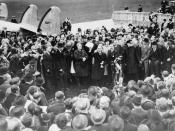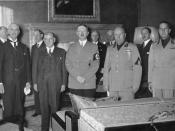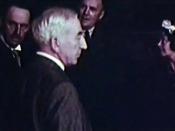The events between 1938 and 1939 caused Chamberlain's policy of appeasement to change. Since October 1938, it was obvious that Hitler's next target was to conquer Poland. Chamberlain now realized that his appeasement policy wasn't going to help any longer. This is was the end of the appeasement policy.
Events in Europe pressured Chamberlain to abandon the appeasement policy. At this point Britain's tasks to protect its imperial colonies were becoming harder. Since December 1938, Britain began to prepare for war because until now Chamberlain was appeasing Hitler and he was relying too much on the peace promises made by Hitler which he wasn't keeping. One reason for this was that Britain wasn't militarily and economically ready for a war, but at this point a war was beginning to be inevitable because people started to realize that it became almost impossible to stop Hitler from invading other countries, and the only possible chance to contrast him was to stop appeasing him.
Events in Britain also pressured Chamberlain into abandoning the appeasement policy. After the Munich agreement (on September 29th 1938) Britain's duty to maintain and to support peace in Europe, and to protect its imperial colonies was becoming tougher. This was a contradictory situation because maintaining peace in Europe meant the reinforcement of Germany in Europe and it competed with the British supremacy in Europe and in the rest of the world. Although, still in 1939 and after the invasion of Prague by Hitler, Chamberlain believed in the necessity of an agreement with him, Britain was still preparing for an inevitable war. From January 1939 Britain was building its navy. On May 1939 Stalin was asking Britain for another triple entente. France was persuading Britain that by showing Hitler a military conviction it would have been easier to stop...


